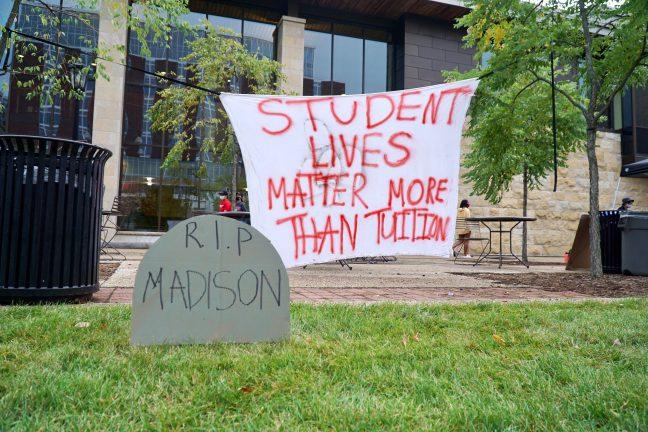To reopen or not to reopen — this was the question plaguing university administrators nationwide ahead of this fall semester amidst the COVID-19 pandemic.
Reopening would require comprehensive testing and contact tracing plans, along with a plethora of enhanced safety measures to give students, parents and faculty alike peace of mind.
Not reopening, on the other hand, meant another completely virtual semester, as well as an onslaught of backlash. At the University of Wisconsin, both the mixture of in-person classes as well as students struggling to have a social life on-campus have all been met with backlash.
When considering the efforts UW has made to curb the viral spread and find a vaccine, it is clear that there are two different narratives as to how this campus has responded to COVID-19.
Debate surrounding Lincoln statue will have generational effect
As essential research flourishes locally, so does this virus’s spread among students.
Most recently, UW was selected as one of a hundred clinical sites across the country to participate in a phase 3 trial to measure the efficacy of a possible COVID vaccine in nearly 2,000 people.
Additionally, the School of Journalism and Mass Communication in collaboration with other campus groups developed COVID-19 Wisconsin Connect, a mobile app “that provides accurate information, social support and helpful resources to Wisconsinites” including a COVID-19 Fact Checker.
Yet in spite of the strides UW is making to disseminate useful information and support ground-breaking research, campus reopening efforts have seen a nearly 7% positivity rate among student testing results, as of Sept.9, as well as a 14-day directive to students to abstain from non-essential activities, and now a two-week dorm lockdown paired with all in person classes being moved online for two weeks as well.
UW’s positive contributions to pandemic research efforts should have extended to effective campus regulations for students, as well as strict consequences for those who do not adhere to such rules. Instead, our so-called Smart Restart fails even when notable factors including the school’s globally-renowned research efforts and hospital presence should indicate otherwise.
With unemployment at an all-time high, Trump’s new relief order is not the answer
Upon further study of schools that have decided to reopen or go remote, it remains abundantly clear that there is little correlation among the schools that have chosen the former. UW has several affiliated hospitals and vast research capabilities, but again, our reopening plan did not curb viral spread among students.
In a study of nearly 1,500 four-year institutions, in which 46 had an affiliated hospital, the most popular choice was to hold classes primarily online.
Even among Big Ten schools, it’s evident that reopening was a piecemeal process, with Michigan State operating remotely, University of Michigan offering a hybrid semester and University of Minnesota delaying the start of its semester.
Across the nation, a possible indication of whether a school was likely to reopen or operate remotely was location, as states with stricter requirements forced universities to operate mainly online to remain compliant.
Similarly, “peer institutions” in the same location, such as George Washington University and Georgetown University in Washington D.C., followed one another’s lead to not reopen in this case.
In Madison specifically, regulations are far less stringent than those in states where positivity rates have shrunk following spring semester.
City residents here can eat indoors, bars are clearly open — you only need to walk down State Street to see the lack of mask compliance for yourself — and there is no mandatory quarantine for folks traveling to Wisconsin.
While UW can implement as many rules as the administration desires in its Smart Restart, the city of Madison is still readily available for students to contract and ultimately spread the virus.
For everyone’s safety, UW must revert to fully online courses for fall semester
On the other hand, stricter universities such as Northeastern, which recently suspended 11 students without a tuition refund for failing to follow school guidelines, have seen significantly lower positivity rates.
Northeastern requires students to show three negative tests prior to on-campus arrival, and this applies to students residing off-campus as well. In addition to that, the school has been testing every student, regardless of residency, every five days, so far conducting over 90,000 tests with only 50 positive results.
In comparison, UW has conducted just over 19,000 tests on campus, as of Sept. 9, making it much harder to detect asymptomatic cases before they infect others.
Granted, UW has a larger undergraduate enrollment than Northeastern, but that only underscores the fact that our university guidelines should be proportionally stricter. The lack of preparedness on behalf of university administrators when it comes to campus safety efforts surprisingly contrasts UW’s efforts in the research sector.
Shouldn’t a university chosen as a test site for a potential vaccine understand the risks at play on the same exact campus?
Instead, the virus’s unchecked spread on campus has overshadowed any semblance of the university’s nationally recognized efforts, at least in the eyes of its student body.
Perhaps our campus’s two-week timeout will give UW leaders a chance to hit restart on our Smart Restart or risk further semesters of uncertainty and lockdowns.
Anne Isman ([email protected]) is a sophomore studying economics.




















